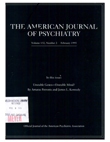Test-retest reliability and validity of the Structured Interview for Sleep Disorders According to DSM-III-R
Abstract
OBJECTIVE: The purpose of this study was to evaluate the reliability of sleep disorder diagnoses in DSM-III-R by using a newly developed interview, the Structured Interview for Sleep Disorders According to DSM-III-R (SIS-D) and to evaluate the concordance between these diagnoses and sleep laboratory data. In addition, the sources of disagreements between two interviewers in the diagnoses given to the same patient were determined. METHOD: Two different interviewers used the SIS-D to diagnose 68 patients with complaints of sleep disorders. The concordance between these interviewers' diagnoses and polysomnographic findings was investigated by using kappa statistics. RESULTS: There were excellent reliabilities for almost all current main diagnostic categories and good concordance between diagnoses made on the basis of the structured interview and polysomnographic data. The main source of disagreement between interviewers was found in the symptom information given by the patient. CONCLUSIONS: These findings provide support for the utility of DSM-III-R sleep disorder diagnoses and for their retention in DSM-IV. These findings also accord well with a recent literature review of the DSM-III-R diagnosis of primary insomnia by the DSM-IV Work Group on Sleep Disorders. The good concordance between interview diagnoses and polysomnographic data suggests that a structured interview such as the SIS-D may be a useful screening instrument. The authors discuss the implications of these findings for the polysomnographic evaluation of chronic insomnia.
Access content
To read the fulltext, please use one of the options below to sign in or purchase access.- Personal login
- Institutional Login
- Sign in via OpenAthens
- Register for access
-
Please login/register if you wish to pair your device and check access availability.
Not a subscriber?
PsychiatryOnline subscription options offer access to the DSM-5 library, books, journals, CME, and patient resources. This all-in-one virtual library provides psychiatrists and mental health professionals with key resources for diagnosis, treatment, research, and professional development.
Need more help? PsychiatryOnline Customer Service may be reached by emailing [email protected] or by calling 800-368-5777 (in the U.S.) or 703-907-7322 (outside the U.S.).



